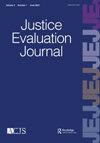Focused Deterrence and Program Fidelity: Evaluating the Impact of Detroit Ceasefire
IF 0.7
Q3 CRIMINOLOGY & PENOLOGY
引用次数: 6
Abstract
Abstract Focused deterrence programs, which concentrate community and police resources on small groups of high-risk offenders, have been identified in a number of cities as an effective method to reduce violent crime. In 2013, the city of Detroit began its own “Ceasefire” program in two of its most violent police precincts, which continued through 2019. This study examines the community-level effect of the 2013–2019 Detroit Ceasefire initiative on fatal and non-fatal shooting victimization. We apply a synthetic control design to account for the complex, disaggregated data to identify the effect of Ceasefire above and beyond the substantial decreases in gun violence observed throughout Detroit. We find marginal decreases in victimizations among those aged 15-24 and 25-34 in the year after Ceasefire was re-organized in 2015, but these effects were limited and largely converged to trends observed in the rest of the city. We discuss the results of this evaluation with a focus on the importance of effective implementation as well as the challenges of studying violence prevention strategies under ever evolving conditions.集中威慑和项目保真度:评估底特律停火的影响
重点威慑计划是将社区和警察资源集中在高危罪犯的小群体上,已在许多城市被确定为减少暴力犯罪的有效方法。2013年,底特律市在其两个最暴力的警察辖区开始了自己的“停火”计划,该计划一直持续到2019年。本研究考察了2013-2019年底特律停火倡议对致命和非致命枪击受害者的社区层面影响。我们采用综合控制设计来解释复杂的、分解的数据,以确定停火的影响,而不仅仅是整个底特律观察到的枪支暴力的大幅减少。我们发现15-24岁和25-34岁的受害人数在2015年停火组织重组后的一年中略有下降,但这些影响是有限的,并且在很大程度上与该市其他地区观察到的趋势一致。我们讨论了这一评估的结果,重点是有效执行的重要性以及在不断变化的条件下研究预防暴力战略的挑战。
本文章由计算机程序翻译,如有差异,请以英文原文为准。
求助全文
约1分钟内获得全文
求助全文

 求助内容:
求助内容: 应助结果提醒方式:
应助结果提醒方式:


